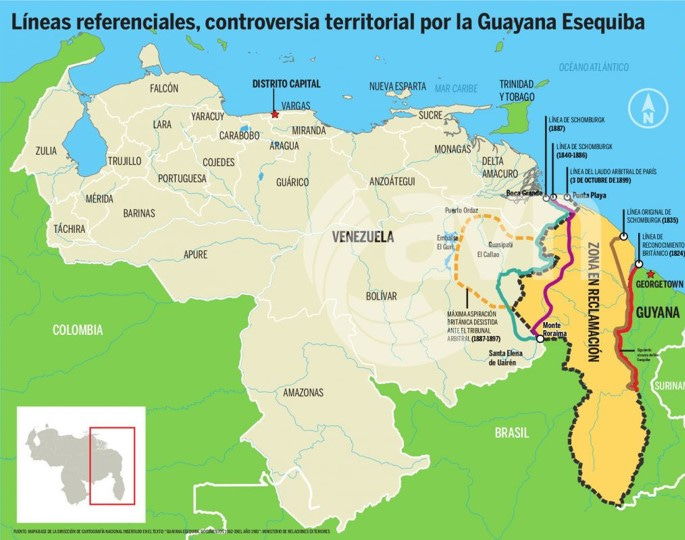WW3 Coming to the Americas? Venezuela Seeks Green Light to Invade Guyana
Putin's Stirring Trouble in America's Backyard
Joe Biden might soon long for simpler times when he thought he was gently sleepwalking America into WW3, through a nightmare that would be over only after his ticket was up. But the road is getting bumpier and bumpier, and the world’s got a lead foot with no brakes.
With America’s hands seemingly full — Ukraine, Israel, and not far behind, Taiwan — now, down south, Venezuela is making moves, pushing forward with a national referendum on December 3rd over the disputed territory of Essequibo — an area of 53,000 square miles, about the size of Alabama or Greece, currently belonging to neighbouring Guyana, a former British colony.
Essequibo is, of course, oil-rich. Estimates put reserves at 1.4 billion barrels of high-quality crude oil, or $115 billion at today’s prices. And it’s not just oil; the region is rich in other natural resources, including gold, diamonds, and timber.
The upcoming referendum asks five questions. First, a call to reject the Paris Arbitration Award of 1899 as “fraudulent”; second, for the support of the Geneva Agreement of 1966; third, the rejection of the jurisdiction of the International Court of Justice (ICJ) over Essequibo — where the matter has been since 2018; fourth, it asks to oppose “by all legal means” Guyana’s claim over the shore. All just diplomatic mise-en-scène. The fifth question, though, is problematic:
5) Do you agree with the creation of the Essequibo state and the development of an accelerated plan for comprehensive care for the current and future population of that territory that includes, among others, the granting of citizenship and a Venezuelan identity card, in accordance with the Geneva Agreement and international law, consequently incorporating said state on the map of Venezuelan territory?
The government of Guyana’s stance is clear: Venezuela’s vote “amounts to nothing less than the annexation of Guyana’s territory,” and the seizure of “two-thirds of Guyana’s territory [...] would constitute an international crime of aggression.” Guyana warns that this action has the potential “to incite violence and threaten the peace and security of the State of Guyana and, by extension, the Caribbean region.”
The long-standing conflict flared up again last month when Guyana offered oil leases in the disputed territory, receiving bids for eight offshore oil & gas exploration blocks, including from US oil giant Exxon Mobil. In response, Venezuela advised prospective bidders to consider any licences issued by Guyana as “null and void.”
It’s important to note that Exxon Mobil is deep in this game already. In 2015, the company announced a significant oil discovery off the coast of Guyana — as much as 700 million barrels of crude, potentially worth as much as $58 billion. It goes without saying that Exxon has influential friends up in Washington, D.C.
Exxon’s siding with the Guyanese government makes sense. Back in 2007, former Venezuelan dictator Hugo Chávez helped himself to $10 billion of Exxon’s assets by nationalising the companies’ interests — for which Exxon was recently awarded a meager $77 million in claims.
Fast forward to 2015, when the current Venezuelan dictator, Nicolás Maduro, signed a decree creating a “defence zone” offshore, theoretically cutting Guyana’s access to the Atlantic Ocean — and establishing sovereignty over the coastal waters that include Exxon’s reserves.
Essequibo’s oil has been a game-changer for Guyana. With the Exxon agreement splitting the profits from exploration roughly in half, Guyana has since become the world’s fastest-growing economy — expected to grow 38% in 2023, according to the International Monetary Fund (IMF). Fitch Solutions forecasts that Guyana’s GDP will rise by about 115% by 2028.
Tanned Geriatric Summer
“If we shadows have offended,
Think but this, and all is mended,
That you have but slumbered here
While these visions did appear.”
William Shakespeare, ‘A Midsummer Night’s Dream’
The script in Venezuela sounds eerily familiar. It’s like Iran all over again, as Joe Biden recently made concessions to Venezuela, easing Trump-era sanctions in an attempt to salvage the Bidenomics trainwreck.
It’s been 18 months of intense negotiations with Venezuela’s dictatorship, including secret meetings in Qatar — the playground for Hamas leaders. Last week, the Biden Regime announced they were lifting sanctions on Venezuelan gold and oil exports for six months, as well as on secondary trading of government bonds. In return, Venezuela would release five political prisoners — who should not have been in jail in the first place.
According to the Financial Times (FT), one former senior US official described the concessions to Venezuela’s dictatorship as “almost breathtaking in their generosity.” The Venezuelan opposition expressed concern that the easing of sanctions was premature and that “US officials were naïve to believe that Maduro had any intention of holding competitive elections” next year, warning that sanctions relief would “boost a criminal bonanza and allow the Nicolás Maduro regime to accelerate the plundering of Venezuelan Amazonia.”
As they do, Biden’s handlers at the State Department moved quickly to dismiss any notions against their naïveté, with a faceless bureaucrat insisting with the FT that “a new incentive structure [is in place], where… they don’t have to sell their energy products on the black market. So that’s going to be more rewarding for the Maduro regime.” Liberalpolitik at its finest!
The Democrats, the EU, NGOs — they’ve all cheered the deal, with a nameless congressional source telling the FT that “We’re really just trying to… draw a line in the sand so you don’t see further authoritarian drift.” But whose? Maduro’s or Biden’s? That part wasn’t so clear.
Bidenplomacy
“You have to pick the places you don’t walk away from.”
Joan Didion
South America is teeming with Putin-aligned, extreme left-wing governments. While Maduro is the poster boy, Brazil’s Lula da Silva has been a reliable puppet. A convicted criminal, Lula da Silva escaped jail following the dismantling of Brazil’s anti-corruption apparatus — a move the OECD decried as “creating de facto impunity in corruption cases” in a recent report.
Under Lula, Brazil has been leveraging its current presidency of the UN Security Council to advance Putin’s causes, such as the scandalous ‘cease-fire’ resolution that would solely benefit Hamas. Lula da Silva has previously denounced the US as one of the instigators of the war in Ukraine and now accuses Israel of “genocide” in Gaza. Last January, Lula da Silva granted permission for two Iranian warships to dock in Rio de Janeiro and has since made economic overtures to Iran, Russia, and China.
Another key Putin-aligned neighbour of Venezuela is Colombia, now under the rule of former M-19 guerrilla member Gustavo Petro. Petro has been described by Putin as “a promising partner,” and has acted as such, working — alongside Mexico’s President López Obrador — to solidify support for Russia’s position in invaded Ukraine among Latin American leaders. Petro has recently publicly taken the side of Hamas, likening Israel’s actions to those of Adolf Hitler.
It’s worth noting that since 2008, Russia has dispatched nuclear-capable Tupolev bombers to Venezuela three times, with the bombers twice encroaching on Colombian airspace, then an American ally. Russia has also sent a nuclear-powered guided-missile cruiser, along with several other ships, to join Venezuelan navy drills in the past.
On top of this, Venezuela is working to secure the type of financial backing that bold moves require. Last September, the country joined the New Development Bank (NDB), a $50 billion bet by China to challenge the US dollar’s dominance, which could help bankroll its geopolitical interests around the world. The usual suspects—Russia, Iran, Brazil—are also on board. And the punchline? According to the World Bank, Venezuela’s armed forces have tripled in size over the last decade:
It’s A Heck Of A Time To Be Half-Alive, Jack!
As generous as the US Congress has been, the US is not yet fully committed to the conflicts in Ukraine and Israel. The support is mainly in aid and weapons—nothing that would prevent the US from getting involved in a conflict elsewhere. Because, frankly, these conflicts are long in distance and short in economic interest.
Guyana’s a different story. But even a ‘successful’ referendum outcome, and the support of a rogue gallery of allies, hardly guarantees that Maduro will get tanks rolling across borders. A full-scale invasion seems unlikely. Unless, in Maduro’s and Putin’s calculations, the US is too confused or busy tearing itself apart to enforce clear deterrence. And one cannot accuse them of underestimating Biden’s and Blinken’s brinkstateship.
One way or another, the conflict in Guyana is shaping up as a prelude to the deepening of the anti-American, pro-Putin alliance of extreme left-wing governments in Latin America. And the fact that this conflict has been flying under the radar for so long is a strong indicator that we might already be sleepwalking towards WW3.
But maybe Biden knows something we don’t know? Last June, the US secured the extradition of Major General Hugo Carvajal — the former military spy chief of Venezuela — from Spain, on charges of drug trafficking. Between propping up imaginary Bidenomics and shifting the focus of the US Armed Forces from winning wars to winning woke points, Biden might have figured out a way to stop the world from taking a decisive step in the direction of WW3 come the 3rd of December. Let’s all trust that as we brace for the worst.
More Articles
Don’t forget to check my serialised fiction project:
dydx - Chapter I: Anodyne
“Sound of teeth brushing the asphalt before bones scatter against it in cruel harmony. A jagged fracture tears a line through Liberty’s lower jaw. A subtle rush of copper-tang blood creeps up her auricular channel. The back of her skull burns. Her body is cold and convulsing, pathetically, like a fish.








